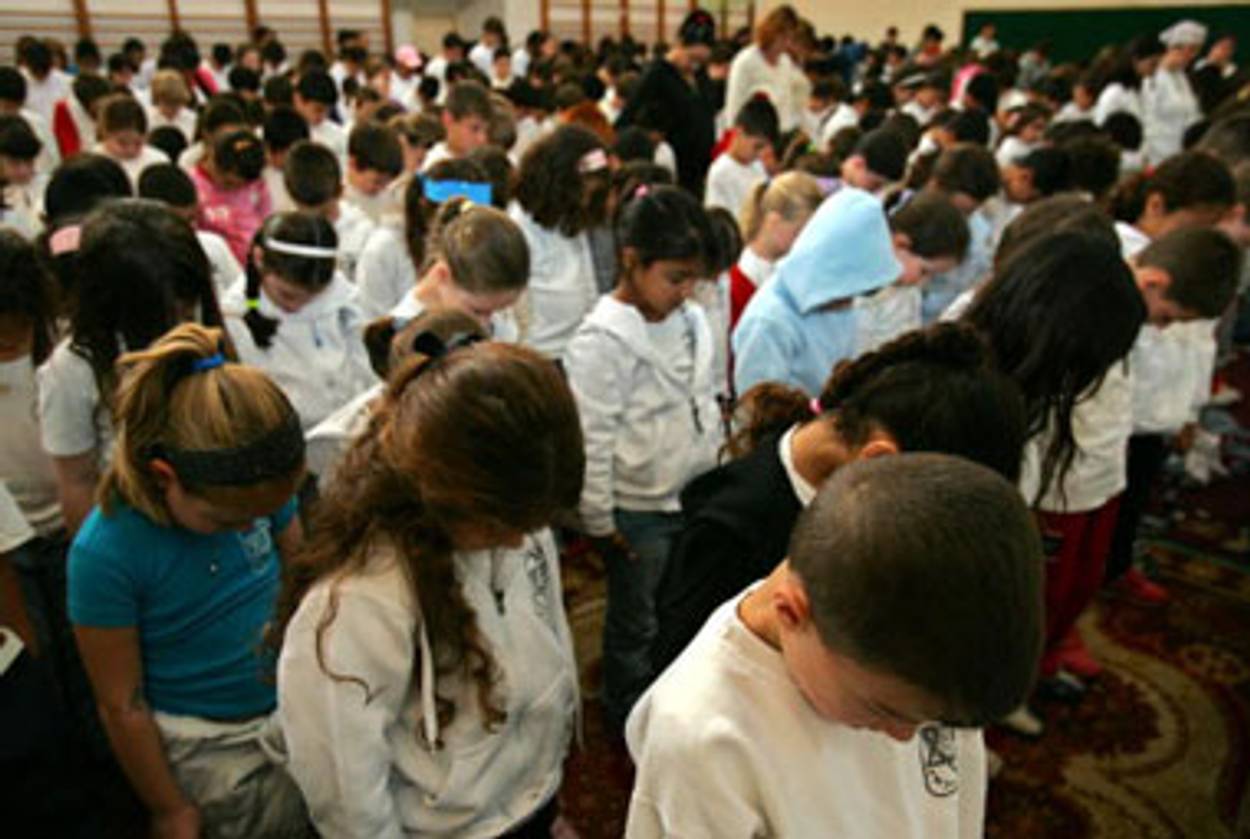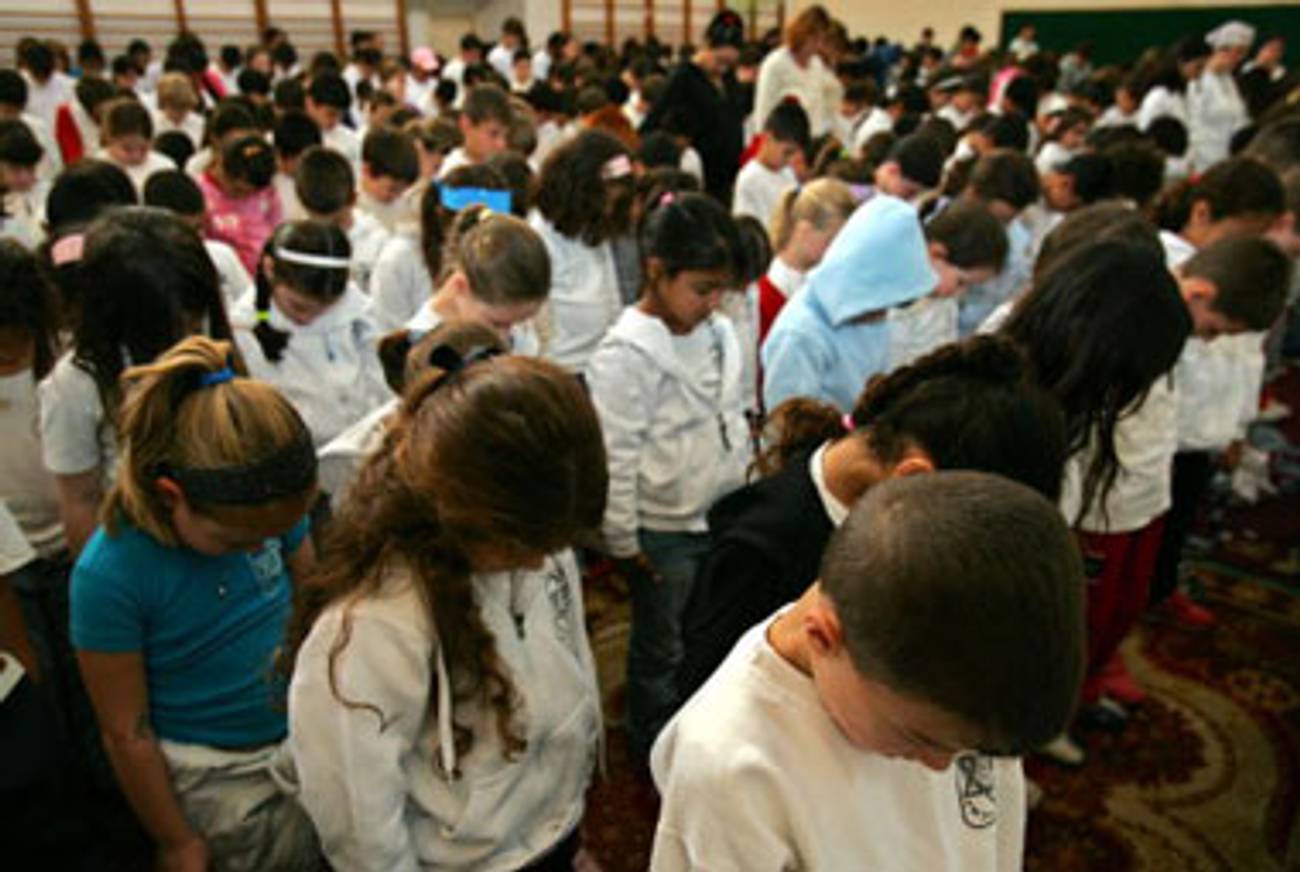Forget About It
A Torah portion of war and remembrance




Growing up in Israel, I was filled with leaden dread leading up to one day each year. On that day, all of us schoolchildren all over the country were instructed to wear a white shirt and, the caressing sun of spring be damned, sacrifice recess to attend a ceremony. Gathering in the school’s auditorium or basketball court, a few poems were recited, a song was sung, and six candles lit, one for each of the Nazi death camps. The day is still known in Israel simply as Yom Ha’Shoah, Holocaust Day.
For a dim-witted and jolly child like myself, Holocaust Day proved an intolerable burden. It wasn’t that the topic itself failed to fascinate; on the contrary, ever since stumbling across Anne Frank’s diary sometime in the second grade, I nursed few obsessions more persistent than the Nazis and their crimes. But Holocaust Day, with its demand of instantaneous sadness, with its recycled pageantry and terrifying iconography, struck me as grotesque. What lesson, I seethed quietly, was I supposed to take from this daylong commemoration that focused so much on pomp and so little on circumstances, on the concrete and complex set of historical developments of which this immense tragedy was composed? What was I supposed to learn?
The nation’s masters of ceremony thought of everything. They must have anticipated my question, as they had designed a one-word solution and printed it on a sticker we were all obliged to wear on Holocaust Day. It featured a red flower against a blue background with black block letters delivering the command: “Yizkor,” it read. Remember.
There could, perhaps, be no more profoundly Jewish concept. What are we, after all, if not a nation bound together by memory, sustained throughout millennia by the wisps of our shared history, the recollections of the past informing the longings of the future?
But memory is never without consequences. In 2007, for example, Viktor Mayer-Schönberger, a professor at Harvard’s Kennedy School of Government, produced a hotly debated paper that claimed that if mankind wished to guarantee the thriving exchange of opinions and ideas, it must first teach computers to forget.
Beautifully titled “Useful Void: The Art of Forgetting in the Age of Ubiquitous Computing,” the paper claims that if we train our machines to continue and accumulate every bit of data, from the purchases we make on Amazon to the photos we post on Flickr, we will soon find ourselves living in a pixilated Panopticon, the notorious prison in which all inmates are constantly observed.
“If whatever we do can be held against us years later,” the paper states, “if all our impulsive comments are preserved, they can easily be combined into a composite picture of ourselves. Afraid how our words and actions may be perceived years later and taken out of context, the lack of forgetting may prompt us to speak less freely and openly.”
It is curious to imagine what Professor Mayer-Schönberger would have to say about this week’s parasha. A compendium of highly detailed laws and commandments read by Moses to the Israelites, it ends with a vague and ominous statement.
“You shall remember what Amalek did to you on the way, when you went out of Egypt,” read the portion’s last lines, “how he happened upon you on the way and cut off all the stragglers at your rear, when you were faint and weary, and he did not fear God. [Therefore] it will be, when the Lord your God grants you respite from all your enemies around [you] in the land which the Lord, your God, gives to you as an inheritance to possess, that you shall obliterate the remembrance of Amalek from beneath the heavens. You shall not forget!”
What a confusing construction, this: don’t forget to obliterate the remembrance of Amalek. Don’t forget to forget? Remember to remember? Just what should we make of this strange clause?
Later Biblical commentators were not as subtle as Moses. Addressing Saul, the newly minted King of Israel, the prophet Samuel provides the young leader with more specific instructions. “Now go and smite Amalek,” he orders, “and utterly destroy all that they have, and spare them not; but slay both man and woman, infant and suckling, ox, and sheep, camel and ass.”
But this interpretation presents a problem. Taken literally, it advocates genocide. Isn’t that what obliterating the remembrance of a whole nation means? Shaken by this strange and dangerous edict, and wary of its possible wicked interpretations, generations of Jewish scholars addressed this verse at depth. The Talmud itself offered the definitive account, claiming that as the wars of Sancherib the Assyrian long ago “mixed up the nations” of the regions beyond recognition, it is impossible to tell who are the Amalekites anymore—and if we don’t know who they are, we can’t kill them. Going a step further, Maimonides, in his guide to the perplexed, suggested that it is not Amalek per se we must remove from the world but Amalekite, or nefarious, behavior, thereby obeying the command to remember by mending the world with education and good deeds. (For an excellent discussion of the Amalek conundrum, see here.)
If nothing else, these debates betray one fundamental truth—that memory isn’t easy. It’s a burden. And it’s one I’ve felt from a young age. Emboldened by the sticker plastered on my chest every Holocaust Day, I grew up and nurtured my desire to remember, to learn more, to better understand. In high school, I traveled with my classmates to Auschwitz, and was appalled to see them translate the traumatic experience of visiting the death camp into a surge of nationalistic pride, waving high the Israeli flag and talking loudly and proudly about their upcoming military service. To them, the commandment to remember was synonymous with strength; never forget meant never again be weak. The same sentiment resurfaced when I visited Yad Vashem for the first time as an adult and was dismayed to see the clear narrative thread that invaluable museum offered its visitors: the very last item on display is Israel’s Declaration of Independence, a curatorial choice that suggests that the sole lesson one must learn from the colossal suffering and demise of millions had to do neither with the ongoing fight against extremism and hate wherever they may roam, nor with the pursuit of the universal values of democracy and justice and freedom, but with the establishment of a strong and independent Jewish state. If this is how we remember, I thought, forgetting may not be so terrible after all.
I found an eloquent proponent of this flammable idea in the Israeli historian Yehuda Elkana. Publishing an article titled “In Praise of Forgetting” in 1988, Elkana, himself a survivor, put forth a highly controversial proposal to his fellow countrymen: forget the Holocaust.
“I do not envision today,” he wrote, “a more important political and educational task for the leaders of this nation than to mobilize on behalf of life, to devote themselves to building our future and not to occupy themselves from sunrise to sunset with the symbols, the ceremonies, and the ‘lessons’ of the Holocaust. It is incumbent upon them to uproot the domination of historical ‘remembrance’ on our lives.”
Elkana, of course, was not advocating that we actively forget the Holocaust, its horrors and its effects. That would be folly. A historian, he was well aware of the need for continuing documentation, for factual evidence and analysis of modernity’s most harrowing massacre. What he was raging against was the manipulation of memory, the assigning of uniform political meaning to an act as introspective and fragile as remembrance.
Witnessing the enthusiasm with which some Jews have received Quentin Tarantino’s reprehensible new film—the film’s producer, Lawrence Bender, called the moronic revenge fantasy a “Jewish wet dream”—I wonder if it isn’t time to take Elkana seriously and, if just for a short while, if only as a thought experiment, learn how to forget.
Liel Leibovitz is a senior writer for Tablet Magazine and a host of the Unorthodox podcast.
Liel Leibovitz is editor-at-large for Tablet Magazine and a host of its weekly culture podcast Unorthodox and daily Talmud podcast Take One. He is the editor of Zionism: The Tablet Guide.